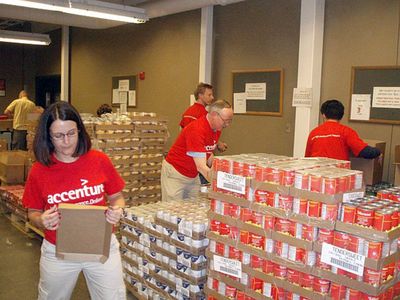Many volunteer during down times

After getting pink-slipped from his cement-plant job a week before Christmas, Nick Maloney indulged in some moping.
For a week or two, the 27-year-old from Fairborn, Ohio, watched TV, played video games and slept until noon.
Then he began to consider a more meaningful way of spending his newfound downtime: Volunteering with a suicide-prevention organization.
“It’s very rewarding,” said Maloney, who lost both his stepbrother and his sister to suicide.
So much so, that he’s considering making his volunteer job permanent.
“There’s a definite possibility of getting into this full-time,” he said. “I just have to see what doors this opens.”
Nonprofit groups around the country are reporting record-setting volunteer interest, helped in part by high unemployment that has given people more free time and resume gaps to fill.
Charity groups also attribute the rise to President Barack Obama’s call to community service and a general sense of wanting to help others through tough economic times.
The Corporation for National and Community Service, the federal agency that tracks volunteer numbers, does not have statistics from the most recent months.
Typically volunteer ranks shrink in a recession, but an estimated 1 million people participated in January’s Martin Luther King Day of Service, twice as many as in 2008, said spokesman Sandy Scott.
His group and others are seeing evidence of a volunteer surge:
•Second Harvest Heartland, the St. Paul, Minn.-based hunger-relief organization, signed up 4,000 volunteers in the last four months, more than it had in the previous year and a half, said spokeswoman Joan Wadkins.
•Applications to AmeriCorps, the national service group, more than tripled to about 9,700 applications in February compared to last year, and applications for the Peace Corps spiked 37 percent during the days surrounding Obama’s inauguration.
•Twice as many volunteers as usual signed up in January for Chicago Cares, a group that links volunteers with hundreds of projects across the city. Affiliate New York Cares also doubled its number of new volunteers year-to-year.
“We can’t open the doors wide enough,” said Gary Bagley, executive director of New York Cares. “Everything we’re doing is full. Our orientations are booked three weeks in advance.”
Bagley’s group has started surveying new volunteers about the reasons for their interest.
Some 30 percent say they’ve had a change in their work situation. An equal number report being unemployed. About 25 percent say they’re heeding Obama’s call to service.
The others say they want to help those hit hard by the financial crisis.
“It’s an interesting sort of harmonic convergence,” Bagley said.
The flood of volunteers has been so great that Second Harvest Heartland set up an all-volunteer “executive council” to come up with ways to mobilize all its new workers.
Chicago Cares has added more daytime programs, a good fit for unemployed volunteers. And Bagley admits feeling the squeeze as his group tries to find work for the flood of new helpers.
He fears losing good volunteers if he can’t make the experience a positive one for them.
“You’ll get a lot of people in the door and then they’re going to be done,” Bagley said.
Anne Abbott is part of Second Harvest Heartland’s council of volunteers – a good fit for the organizational effectiveness specialist from Bloomington, Minn.
Abbott, 57, had tutored and mentored kids for years but decided to step up her volunteerism after work at her own business slowed to a trickle and she closed up shop at the end of December.
“It’s such good work. It’s so meaningful,” she said.
“I found myself trying to get the corporate full-time work, turning myself into a pretzel to meet their needs. And I thought to myself, ‘What am I doing this for? Go with the nonprofit.’ ”
Now, Abbott is using her volunteer work, in part, to “re-network.”
“Even though I don’t have anything, I know I’ll get something. I just know it,” she said.
It may not be their primary motivation, but volunteering is a savvy move for those who are unemployed or underemployed, Scott said.
“It’s a way to stay active, connected, hone your professional skills or learn new ones. Or have a door opened to potential jobs,” he said
Abbot has no regrets about closing her business. In fact, she said, “I sleep better.
“There is such a need and I don’t even have a clue as to what the need is, it’s so big and it’s so tremendous. It’s overwhelming,” she said.
“So, if I can make a small difference, then it’s all worth it.”